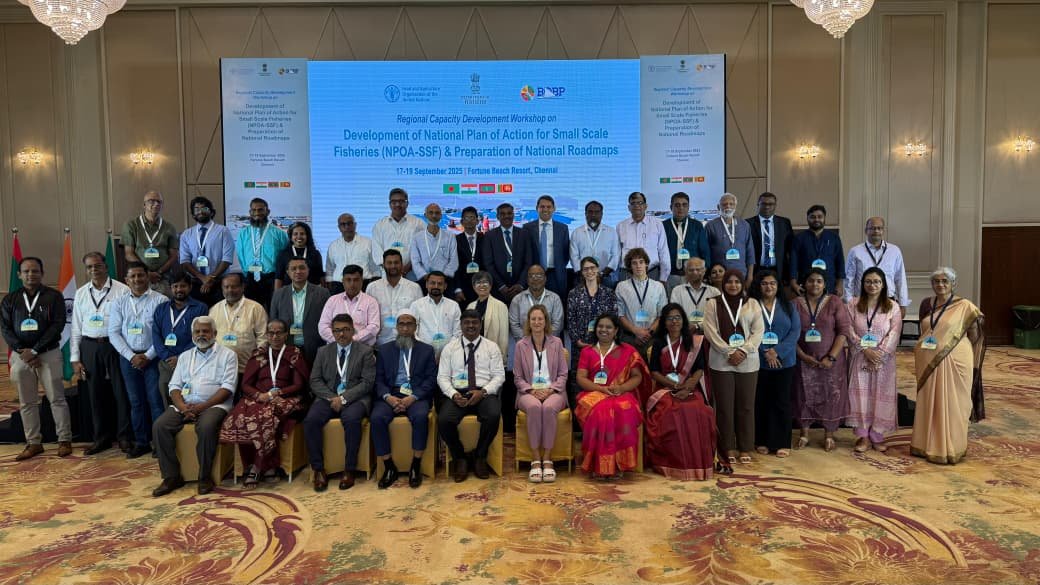Sunday, 1 February 2026

At a regional meeting of the country representatives from Bay of Bengal region, India has demanded climate justice in global and regional fisheries governance, stressing that countries contributing least to climate crisis should not bear the heaviest costs.
Inaugurating the three-day regional meet organised by the Food and Agriculture Organization (FAO) of UN and the Bay of Bengal Programme Inter-Governmental Organisation (BOBP-IGO) in Chennai on Wednesday, Union Fisheries Secretary Abhilaksh Likhi said the country is among the world’s lowest fisheries subsidizers and one of the most disciplined in sustainability harnessing fisheries resources.
“The principles of climate justice must apply. Those who contributed least to the problem should not be asked to pay the greatest price. In India, the fisheries sector is driven by small-scale fishers who are the defenders of local economy, food security, nutrition and culture”, the Secretary said.
The regional capacity building meet from September 17 to 19 is aimed at developing National Plans of Action (NPOA) for the small-scale fisheries in the Bay of Bengal rim countries.
The secretary also called for stronger regional support to protect small-scale fisheries, the backbone of the Bay of Bengal region’s economy and food security.
“Extreme weather, coastal erosion, and warming seas are already undermining fish stocks and the safety of fishing communities in the Bay of Bengal, while the poorest fishers lack the capacity to adapt without international support. Small-scale fisheries in developing countries are the hardest hit, as the sector is under severe pressure from global crises, market forces and competition”, Mr. Likhi said. He urged the Bay of Bengal nations to coordinate on early warning systems, climate adaptation strategies, and joint research programmes.
“India is considering NPOAs for small-scale inland and marine fisheries, with FAO and BOBP-IGO expected to play key roles in shaping and implementing these plans.
The country stands committed to inclusive and sustainable growth in fisheries through collaborative and coordinated efforts and climate-resilient fisheries in the Bay of Bengal”, the Union Fisheries Secretary said.
Calling NPOA for small-scale fisheries a collective response to challenges ahead, the Secretary said FAOs guidelines would be vital in creating country-specific roadmaps.
Highlighting India’s growth in fisheries, Abhilaksh Likhi said fish production rose to 195 lakh tonnes in 2024-25 with over 100% in a decade since 2013-14. According to him, the Central government’s flagship programmes such as the the Pradhan Mantri Matsya Sampada Yojana (PMMSY) with an outlay of Rs. 20,050 crores have empowered women in fisheries, expanded insurance to over 31 lakh fish farmers and created modern infrastructure.
FAOs International Fisheries Analyst Dr. Lena Maria Westlund said small-scale fisheries provide nearly half of Asia’s fish production and employ over 46 million people. Resource management, social and economic development, value chain, gender equality and empowerment, disaster risks and climate change are some of the components in the FAO’s guidelines for preparing the action plan for the sector.
“BOBP is committed to assist the small-scale fisheries in the region and has already started exercise to help the countries to move forward developing country-specific action plans for improving the small-scale fisheries sector”, said Director Dr P Krishnan.
Senior officials from FAO and BOBP, policymakers, marine scientists and fisherfolk representatives from India, Sri Lanka, Bangladesh and Maldives are attending the meeting.